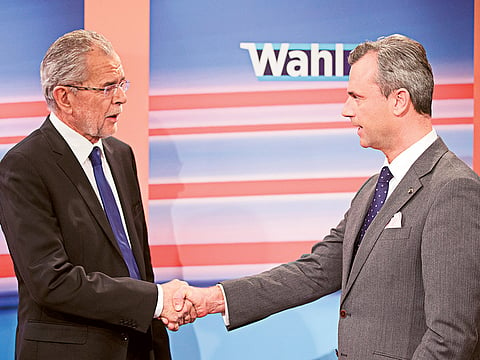Austrian far-right defeated in cliffhanger presidential election
Van der Bellen defeats Hofer's bid to become first far-right head of state in western Europe since WWII

Vienna: Austria elected economics professor Alexander Van der Bellen the country's next president by a razor-thin margin, foiling Freedom Party candidate Norbert Hofer's bid to become the first far-right head of state in western Europe since World War II.
Van der Bellen, who was backed by the Green Party, took 50.3 percent of the votes to 49.7 percent for Hofer, Austria's Interior Minister Wolfgang Sobotka told reporters in Vienna on Monday.
His winning margin over Hofer came down to a little more than 31,000 votes, according to the official result, which is preliminary until June 1 pending possible legal challenges.
Austrian Freedom Party leader Heinz-Christian Strache conceded his party's defeat in a posting on his Facebook page shortly before the official announcement, saying that despite a strong campaign, Hofer had finished "millimeters" short of victory.
The photo finish to Sunday's runoff election laid bare the nation's political divide over fundamental issues like the refugee crisis, relations with the European Union and kick-starting the Austrian economy as it falls behind EU neighbors. Those divisions augur an uphill battle for the government under new Chancellor Christian Kern in the coming months.
Government 'Dormant'
"This all started with a dormant government that refused to push reforms and refused to communicate with the electorate," said Thomas Hofer, a political consultant in Vienna. "The government has to engage in crisis management now, it has to deliver more than expected."
Austria was polarized by the run-off for what is traditionally a ceremonial role, with most Austrians saying the result would amount to a fundamental decision about the country's political future. Van der Bellen has pledged to try and unify the country and overcome the campaign's divisions, while Hofer, 45, had said he would use the authority of a popular mandate to weigh into the nation's politics. His party campaigned on an anti-immigration, European Union-skeptic platform.
"I'll certainly endeavor to build bridges over the trenches that have been dug, to certainly not dig them deeper, and to make an effort to take everybody in this country with me," Van der Bellen told supporters on Sunday.
The election followed four weeks of political upheaval triggered when Hofer, a veteran official of the Freedom Party, came out ahead in the initial round April 24. Neither of the governing parties secured enough support to progress to the next round, triggering the resignation of Chancellor Werner Faymann and his replacement by fellow Social Democrat Kern.
'Encrusted' System
Strache suggested on Sunday that the increased turnout seen in the runoff showed that other parties had rallied around Van der Bellen to keep out his party's candidate. "The entire encrusted political system stood up against Hofer," he said.
"Of course I'm sad today," Hofer said on Facebook. "The effort that went into this campaign isn't lost but is an investment in the future."
Victory for Van der Bellen puts a breakthrough for right-wing populists across Europe on hold. Hofer's party is allied with Marine Le Pen's National Front, the Dutch anti-Islam Freedom Party led by Geert Wilders and the Alternative for Germany party. All are polling strongly ahead of national elections in France, the Netherlands and Germany next year.
Regional results underlined the split between rural and urban voters. Before Monday's count of absentee ballots, Van der Bellen took 61 percent of the vote in Vienna and had a majority in all but one capital of the eight other provinces, including Salzburg, Innsbruck and Graz.
Hofer took most rural areas and two working-class districts of Vienna. Sixty percent of men voted for Hofer and an equal number of women for Van der Bellen.
Regardless of the presidential result, "the government has a huge problem," said Peter Filzmaier, a professor of political science at Krems University. "The relaunch with the new chancellor must succeed this time, or else this government is history."
Sign up for the Daily Briefing
Get the latest news and updates straight to your inbox



